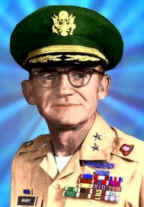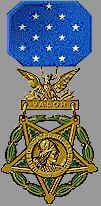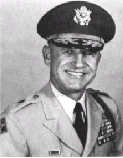|


|
MOH
Presented
by the President in the Name of the Congress, it is the highest honor
that can be bestowed upon any American. The men who wear it call
themselves "recipients" (not winners), for what they
received it for was not a contest...it was a time of terror and death
where their valor was tested, then recognized by a grateful Nation.
All of them feel that they didn't win The Medal...they RECEIVED
it. Frequently called "The Congressional Medal of
Honor", its true title is simply:
MEDAL OF
HONOR
Source:homeofheroes.com
|
The
Medal
of Honor was created in 1861. Today there are three types of MOH:
Army, Air Force, and Navy.
Since
the
first award of the MOH made March 25, 1863, during
the Civil War, through the Global War on Terrorism (Operation Enduring Freedom
- War in Iraq and Operation Eduring Freedom - War in Afghanistan) there
have been:
3,467
Medals of Honor awarded to our nation's bravest Soldiers,
Sailors, Airmen, Marines, and Coast Guardsmen and eight civilians
For
3,461 separate acts of heroism
Performed
by 3,448 individuals (including 9 “Unknowns”)
(As
of June 2, 2008)
Source:homeofheroes.com
|
| As
of June 2008, there are 105 MOH recipients still with us: 30 - WWII,
14 - Korea, and 61 - Vietnam.
Source:homeofheroes.com
|
|
FOR
DETAILS ON ALL MOH RECIPIENTS GO TO SOURCES
AT:
HOME
OF HEROES
CMOH
SOCIETY
ARMY
CENTER OF MILITARY HISTORY- MOH
List
|
POOR
IS THE NATION
THAT HAS NO HEROES;
SHAMEFUL IS THE NATION THAT HAS THEM AND FORGETS
From a military monument at
Bolivar,TN
Source:specialoperations.com |
|
MEDAL OF
HONOR RECIPIENTS WHO SERVED IN PANAMA
| MABRY,
GEORGE L., Jr. -
Major General, U.S.
Army retired - (MOH
- WWII 1944) |

Maj. Gen.
George L. Mabry, Jr., in 1970-1974
(SOURCE
-- Photo courtesy of HomeOf Heroes.com) |
Brigadier
General Mabry's first of two assignments in the Panama Canal Zone
was as Director of J3/Operations Directorate
of the U.S. Southern Command, the regional unified command at Quarry
Heights in the then Panama Canal Zone in the mid-1960s (including
during the
riots of January 1964). He later returned as a major general
and the
last commanding general of U.S. Army Forces Southern Command (USARSO) at
Fort Amador, Panama Canal Zone (December 1970 - October 1974). He
oversaw the reorganization of USARSO in late 1974 from an Army overseas major
command to an installation under U.S. Army Forces Command (Fort McPherson,
Georgia) but still under the operational command of the U.S. Southern
Command. Following the reorganization, he was the first commanding
general of the 193d Infantry Brigade (Canal Zone) (November - December
1974). Prior to his retirement from the Army in 1975 he
commanded the U.S. Army Readiness Region V at Fort Sheridan,
Illinois. He died on
July 13, 1990.
Mabry received his Medal of Honor
for heroism during World War II in Germany when he was a lieutenant
colonel (citation below). Mabry was the second most highly decorated
soldier in the American military, the first being Captain Audie Murphy.
(In addition to the MOH, he received the following decorations and awards
during World War II: Distinguished Service Cross, Silver Star,
Bronze Star Medal with "V" Device, Arrowhead and Oak Leaf
Cluster, Purple Heart, Presidential Unit Citation, Distinguished Service
Order (British), Belgian Fourragere, Combat Infantry Badge, and five
campaign medals.)
(For a biography
and more information, go to https://members.tripod.com/~msg_fisher/mabry.html
)
|
|
|
|

The President of the United
States
in the name of The Congress
takes pleasure in presenting the
Medal of Honor
to
LTC George L. Mabry Jr.
Commander, 2nd Bn, 8th Infantry
November 20, 1944

(SOURCE
-- Photo courtesy of Irving Smolens)
Rank and organization: Lieutenant Colonel, U.S.
Amy, 2d Battalion, 8th Infantry, 4th Infantry Division
Place and date: Hurtgen Forest near Schevenhutte,
Germany, 20 November 1944.
Entered service at: Sumter, S.C. Birth: Sumter,
S.C.
G.O. No.: 77, September 1945.
|
|
Citation Reads:
He was commanding the 2d
Battalion, 8th Infantry, in an attack through the Hurtgen Forest
near Schevenhutte, Germany, on 20 November 1944. During the early
phases of the assault, the leading elements of his battalion were
halted by a minefield and immobilized by heavy hostile fire.
Advancing alone into the mined area, Col. Mabry established a safe
route of passage. He then moved ahead of the foremost scouts,
personally leading the attack, until confronted by a boobytrapped
double concertina obstacle. With the assistance of the scouts, he
disconnected the explosives and cut a path through the wire. Upon
moving through the opening, he observed 3 enemy in foxholes whom he
captured at bayonet point. Driving steadily forward he paced the
assault against 3 log bunkers which housed mutually supported
automatic weapons. Racing up a slope ahead of his men, he found the
initial bunker deserted, then pushed on to the second where he was
suddenly confronted by 9 onrushing enemy. Using the butt of his
rifle, he felled 1 adversary and bayoneted a second, before his
scouts came to his aid and assisted him in overcoming the others in
hand-to-hand combat. Accompanied by the riflemen, he charged the
third bunker under pointblank small arms fire and led the way into
the fortification from which he prodded 6 enemy at bayonet point.
Following the consolidation of this area, he led his battalion
across 300 yards of fire-swept terrain to seize elevated ground upon
which he established a defensive position which menaced the enemy on
both flanks, and provided his regiment a firm foothold on the
approach to the Cologne Plain. Col. Mabry's superlative courage,
daring, and leadership in an operation of major importance exemplify
the finest characteristics of the military service.
|
(Citation courtesy of
Home Of Heroes.com)

| This
page last updated: July
4, 2008 |
 |
| Site
developed, owned and maintained by |
| William
H. Ormsbee, Jr. 1999-2001
/ 2005-2008 |
| (Including
WHO's IN
RETROSPECT site 1999-2001) |
|
![]() SCROLL
SCROLL